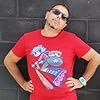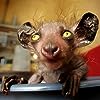To answer questions about
Klara and the Sun,
please sign up.
Laura
This answer contains spoilers…
(view spoiler)
Joe
This answer contains spoilers…
(view spoiler)
Jim
Purposely, Ishiguro left a lot of questions unanswered. Lifted versus unlifted? It's briefly mentioned that it's a DNA modification issue with some inherent risk.
The way the story is told, the sun itself is an important character. Since there's no other evidence of mysticism in the novel, I think we're meant to take Josie's recovery as literal. So I would conclude that lifting means inserting something into the DNA that enhances intelligence and may require solar power. She was dying because the technology, like Klara's model of AFs, wasn't as efficient when it came to using solar power. Perhaps the storm created some sort of refraction effect that generated enough sunlight in Josie's bedroom to jump-start her DNA.
I'm guessing that the Manager was another model of AF, and the limp some indication that she was breaking down and no longer able to work effectively at that job. Or, we could speculate that something interfered with the birth rate, and Josie and her "lifted" friends are all another model of AFs, while Rick was one of the increasingly rare "real" children.
Who knows? That's the magic of Ishiguro - he never spells everything out.
The way the story is told, the sun itself is an important character. Since there's no other evidence of mysticism in the novel, I think we're meant to take Josie's recovery as literal. So I would conclude that lifting means inserting something into the DNA that enhances intelligence and may require solar power. She was dying because the technology, like Klara's model of AFs, wasn't as efficient when it came to using solar power. Perhaps the storm created some sort of refraction effect that generated enough sunlight in Josie's bedroom to jump-start her DNA.
I'm guessing that the Manager was another model of AF, and the limp some indication that she was breaking down and no longer able to work effectively at that job. Or, we could speculate that something interfered with the birth rate, and Josie and her "lifted" friends are all another model of AFs, while Rick was one of the increasingly rare "real" children.
Who knows? That's the magic of Ishiguro - he never spells everything out.
Bob Grenier
Isn't the ending the way we all might end up? We've lost our primary role in the lives of others. We have many memories to reflect upon.
Andrew
I took it as deliberately ambiguous. With Klara’s deteriorating perception - seeing Manager, but noticing a limp that seemed remarkably like Josie’s - we get to decide if it was Manager or Josie that found Klara at the Yard.
I like the idea of it being old Josie tracking down her long lost best friend. It spoke to the story’s earlier sentiment that although people can grow apart, they’ll still always be together, and they found each other again after many years just like the Raincoat Man and Coffee Cup Lady did.
At first it was sad to think where Klara ended up (I took the “Yard” to be a junkyard) but the more I think about it, the fact that she’s blissfully ignorant of this, and gets to spend her time reliving happy memories in the warmth of the sun without any regrets, was actually a pretty sweet way to end it.
I like the idea of it being old Josie tracking down her long lost best friend. It spoke to the story’s earlier sentiment that although people can grow apart, they’ll still always be together, and they found each other again after many years just like the Raincoat Man and Coffee Cup Lady did.
At first it was sad to think where Klara ended up (I took the “Yard” to be a junkyard) but the more I think about it, the fact that she’s blissfully ignorant of this, and gets to spend her time reliving happy memories in the warmth of the sun without any regrets, was actually a pretty sweet way to end it.
Ronald
I think everyone is so caught up in theories about uplift and AF’s replacing children and how so much is left unanswered that they are missing the story for what it is. (Some moron even brought up vaccinations). The story is actually really simple. Each AF is unique, each is an experiment in cognitive abilities, and one was close to godliness. I’m not a faithful man, but I do have faith. I strongly believe that Christianity, Buddhism, Hinduism, Muslimism… you get the point, have merit and at there truest form, all have faith in something bigger, intangible, present and good. They also have their heros of faith. Meet Klara, the Artificial Friend messiah. All us humans wouldn’t recognize a robot divinity because we are all so caught up in our oblongs, our work, the problems in the world , again you get the point. Klara is our Christ figure, that while not understanding the world at large, recognizes the fundamental need to do good, and recognizes good and bad in others (forgivingly), the beauty of the world,n and elements like bad bulls and good sheep. She performs a miracle (clearly ignored) with her cognitive faith and then slowly fades literally and figuratively because ‘she’ is just a machine. Is the Sun god, or just a representation of her faith? Is the shop manager God visiting Klara on the junkyard cross? Limping along but still kicking, yet not looking back. We could go on and on. Klara was not an antihero, hero, or anything else, she was just a great AF, lived her life by her code (pun intended), performed a miracle, and forgotten by indifference. Some fell the ending was sad… why? Klara was happy, the people that feel sad feel sad for the world and how flippant it can be, but that’s the world. It is a beautiful story and in the end if it makes you think, it is successful. Look in your own life for the Klara’s and don’t ignore them! Slay apathy
Madhav
My mother is 86 and has Alzheimer's.
She's amazing observational power when she choses to focus on something. Her memories get mixed up. And, she is,apparently, happily fading!
Well, the ending kind of traumatised me because of this personal association.
She's amazing observational power when she choses to focus on something. Her memories get mixed up. And, she is,apparently, happily fading!
Well, the ending kind of traumatised me because of this personal association.
Molly Montgomery
This answer contains spoilers…
(view spoiler)
Judy Lindow
The medical segregation in the story is like what we're going through right now with the looming mandate for a global, recurring vaccine. I recommend watching the VAXXED movies, especially VAXXED ll to be startled by how similar to the story is to the real life risks and stress is for parents and children. Vilifying the unvaccinated is accelerating in our communities, much like in the story. And just as Klara is described as an artificial friend (AF) all of us - and probably teens even more - how important our social media friends were to us during lockdown. One irony that slipped by me is how the father proved that Klara was just a machine and how in the end many of experienced a sense of betrayal when Facebook censored and sold our posts. In the end it is just technology, isn't it.
At the end of the story Klara is enjoying the sun, which is key to who she is as the sun represents her God, who gives her life and her spirituality. And by the way, often a stand-in for what we don't understand (which may be the starting and ending place for AI). She's reviewing her life, just like a human does in their slow fade. I did not realize until the end how much power she had when Josie was on her deathbed. She had the potential human love of the mother and Rick being offered to her and so I wondered if she'd systematically thought it through
... but the way her adrenaline was pumping when the sun came and saved Josie - to me that was proof that she acted driven by purpose: care and love of Josie. Conversely, she may have acted to save herself, after all part of being human is loving yourself enough to know you wouldn't trade places with anyone (though there is little evidence that she was programmed or ever acted out of self preservation).
By the end, however, she knows WHY she made the decision. She says to Manager she didn't think her continuing as Josie would not have worked, not because she couldn't emulate Josie, but because she couldn't have meant what Josie was in the hearts of the people who loved her. So even though she wasn't making being life and death decisions -- she was evolved to a place where she could review, analyze, and reminisce (all high brain functions, I'm pretty sure)
... Ironically, manager, is doing a human version of a slow fade physically and mentally - also true to herself enjoying trinkets and checking on her AFs. Rosa who was less attentive and not as brilliant probably was always more at risk (it was hinted at more than a couple times that she'd had a difficult life). Klara doesn't make an effort to be with AFs (who would all be more less kind than what they learned in their lifetimes) who she'd have no more in common with than a stranger.
At the end of the story Klara is enjoying the sun, which is key to who she is as the sun represents her God, who gives her life and her spirituality. And by the way, often a stand-in for what we don't understand (which may be the starting and ending place for AI). She's reviewing her life, just like a human does in their slow fade. I did not realize until the end how much power she had when Josie was on her deathbed. She had the potential human love of the mother and Rick being offered to her and so I wondered if she'd systematically thought it through
... but the way her adrenaline was pumping when the sun came and saved Josie - to me that was proof that she acted driven by purpose: care and love of Josie. Conversely, she may have acted to save herself, after all part of being human is loving yourself enough to know you wouldn't trade places with anyone (though there is little evidence that she was programmed or ever acted out of self preservation).
By the end, however, she knows WHY she made the decision. She says to Manager she didn't think her continuing as Josie would not have worked, not because she couldn't emulate Josie, but because she couldn't have meant what Josie was in the hearts of the people who loved her. So even though she wasn't making being life and death decisions -- she was evolved to a place where she could review, analyze, and reminisce (all high brain functions, I'm pretty sure)
... Ironically, manager, is doing a human version of a slow fade physically and mentally - also true to herself enjoying trinkets and checking on her AFs. Rosa who was less attentive and not as brilliant probably was always more at risk (it was hinted at more than a couple times that she'd had a difficult life). Klara doesn't make an effort to be with AFs (who would all be more less kind than what they learned in their lifetimes) who she'd have no more in common with than a stranger.
Nancy
I think the Manager was limping just due to her being older. But think Klara's notice of it shows that, even as her strength waned, she was still very observant, just as she was when she noticed Josie's limp so many years ago, and that she remembered how her manager used to walk, etc. I gathered that Klara's strength was waning b/c (1) she was in the Yard and (2) her memories would occasionally combine (although she was able to separate them when she focused) and (3) she had changed in that she wanted to just be alone with her thoughts rather than socialize with the other AF's who had chosen to be together in the Yard.
Clarice Yamasaki
I just love that we feel sorry for Klara even though she doesn't feel the same way.
Sharon Sheppard
I thought this book was a commentary on the features of human nature that are the most essential. Clearly Kazuo Ishiguro believes through Klara's voice that it is chasing optimism, hope and possibly faith (metaphorically represented as the sun in this novel) that are more important. Whether it's the genetic enhancements of the intellectually 'lifted' children and or newer technological attributes of the B3 AFs, Ishiguro's seems to be showing that they have limitations. Klara doesn't always fully comprehend the world accurately, but she is always observing trying to figure it out the best she can guided by her inner 'optimism' that stays singular till the very end of the novel. Klara observes quite keenly that it is the society of the others we are close to that definite us as much as our innate qualities and we are always in a state of moving on and transforming those relationships and sometimes tossing them aside for other relationships or for time alone. Klara observes this as natural, though, and part of the way of things. Even so I think Ishiguro also seems to be showing how human beings take optimism, like relationships, for granted and toss both easily aside. Klara ends up in the junk yard after all. It's telling when the manager asks Klara at the end whether if she wants be moved to be closer the B3s, she declines. In the end it seems that the robot understands humanity better than the humans in the story did.
Powerful story. Very well constructed and an interesting perspective.
Powerful story. Very well constructed and an interesting perspective.
RTeal
I kind of feel that the most "human" character in the story is Klara. Her sense of wonder and appreciation of beauty in the world, her loyalty, self-sacrificing love, her spirituality. She shows some of what is best of humanity.
Hanlie Pieterse
I thought the book was a commentary on firstly how we push our children to perform (especially in the Asian culture) to the point where parents would choose a potentially dangerous DNA modification procedure to make them brighter and more acceptable to society.
The second big commentary is how easily us humans get rid of our companions (dogs, AFs etc). Even though Klara gave so much of herself to Josie, the moment Josie has no more use for her, she gets left in a scrapyard to "fade". It seems very brutal especially as Klara has proven to have quite a heart herself and in effect saved Josie's life.
The second big commentary is how easily us humans get rid of our companions (dogs, AFs etc). Even though Klara gave so much of herself to Josie, the moment Josie has no more use for her, she gets left in a scrapyard to "fade". It seems very brutal especially as Klara has proven to have quite a heart herself and in effect saved Josie's life.
Sylvie
I was disappointed with the ending, it just felt flat. Nothing is worked through, there is no transition, and as some of the comments show, there are many unexplained incidents. I just assumed Klara is in a knacker's yard, which is a very bleak conclusion.
Mike
Life goes on, but not as before. AFs are becoming unwanted. Is 'lifting'? Genetic engineering sometimes doesn't turn out as the parent wants it to. Josie's sister died from, shall we say, a failed lift off. Rick hasn't been 'lifted'. His mother couldn't afford the operation. Today, most of the parents who dearly want their offspring to succeed, pay for private education, if they can afford it. If they can afford it, a parent buys an AF for their child. Their child has an artificial friend. The poor get dogs. The homeless man has a dog--they are 'man's best friend'. The commodification of human relations continues apace. Such is Ishiguro's speculative fiction, Even though Klara acts with the kindness of a saint, she is finally consigned to the junkyard. The throwaway society is based on treating others as objects, not living subjects. Josie throws Rick away. Rick builds drones. Could an Eloi ever marry a Morlock?
Melissa
I'm curious about Mr. McBain's barn. We see elements of the store in there - the shelves, the mugs. What am I missing?
Carl
I would love a larger view of this near future world. Why was Father, an engineer and quite a knowledgeable one considering he could help Klara with an obscure method of carrying out her plan?
Why did Melania Housekeeper leave so suddenly when she seemed to be performing effectively?
How common is being "lifted"?
I took "being lifted" as a dangerous gene modification procedure but having read some others thoughts I can see it as a the conversion from of a child human to android. Perhaps Mother did buy a B3 and Josie was "lifted" into that mind using Capaldi's "portrait" as an outer covering. This is pure speculation, of course, there is no textual evidence that she bought a B3.
Why did Melania Housekeeper leave so suddenly when she seemed to be performing effectively?
How common is being "lifted"?
I took "being lifted" as a dangerous gene modification procedure but having read some others thoughts I can see it as a the conversion from of a child human to android. Perhaps Mother did buy a B3 and Josie was "lifted" into that mind using Capaldi's "portrait" as an outer covering. This is pure speculation, of course, there is no textual evidence that she bought a B3.
Nicole E
This answer contains spoilers…
(view spoiler)
Crabbygirl
when I was a child I had stuffed animals that I named, created relationships and storylines between them. and even when I got older and 'put away my childish things' I STILL didn't like to leave them where they couldn't 'breathe' or be with each other.
Yes that utterly stupid but it's what came to mind when Josie makes a platform for Klara to look outside the upper window in the utility closet. Klara is a plaything that Josie has outgrown.
In time, I was able to pack the stuffed animals in a box (but still not get rid of). Then I moved the box to the garage. After a time the box went to goodwill. And this is what happened to Klara. Her being in the junkyard is because she is an outgrown toy. It's not an act of cruelty but lots of readers see it as such because they identify with her humanity.
Can I also add that I think Klara DID save Josie? And that it is not explainable. I guess that means we're veering into magical realism, but it's a defining moment for Klara and it allows her to find meaning in her 'life'. she is not sad in the junkyard as she replays memories. she's not even interested in talking with the other AFs. she is content with the life she chose. Isn't that how we all want to face the end?
Yes that utterly stupid but it's what came to mind when Josie makes a platform for Klara to look outside the upper window in the utility closet. Klara is a plaything that Josie has outgrown.
In time, I was able to pack the stuffed animals in a box (but still not get rid of). Then I moved the box to the garage. After a time the box went to goodwill. And this is what happened to Klara. Her being in the junkyard is because she is an outgrown toy. It's not an act of cruelty but lots of readers see it as such because they identify with her humanity.
Can I also add that I think Klara DID save Josie? And that it is not explainable. I guess that means we're veering into magical realism, but it's a defining moment for Klara and it allows her to find meaning in her 'life'. she is not sad in the junkyard as she replays memories. she's not even interested in talking with the other AFs. she is content with the life she chose. Isn't that how we all want to face the end?
Marla K
This answer contains spoilers…
(view spoiler)
Gail Marie
This answer contains spoilers…
(view spoiler)
Shelley Wildgrube
I also thought it was odd that the Father went along with Klara's idea to destroy the Cootings Machine because he must have known they'd just replace it. And with security cameras everywhere, how were they not caught?
The ending was depressing, but that's to be expected from a dystopian novel I suppose. Trying to imagine the Mother just kicking Klara out of the car at the dump. (Welp, smell ya later!!) So strange and sad.
The ending was depressing, but that's to be expected from a dystopian novel I suppose. Trying to imagine the Mother just kicking Klara out of the car at the dump. (Welp, smell ya later!!) So strange and sad.
George Morrison
This answer contains spoilers…
(view spoiler)
Patrick Stirling
I think it's all more straightforward!
<spoiler>Klara's obsession with the sun is purely her own - she's solar powered and has amplified that in her own mind and made a god of the sun
Josie is ill either due to Munchausen by proxy from her mother, there were a few hints of this, or a side effect of being lifted. Her sister Sal didn't survive for the same cause, whichever it was.
Josie recovered coincidentally with the storm, it was just Klara's interpretation that the Sun healed her. Actually IIRC she doesn't really start recovering for several days after the storm.
As for the very ending, After Josie heads off to college, The Mother sends Klara off to the Yard. It's interesting that they don't just turn her off, but leave her to rot there - "gradual fade" as it's put. Perhaps there's no off switch, or perhaps society really is that unfeeling. This latter is to me the main theme of this book. Cf Never Let Me Go!</spoiler>
<spoiler>Klara's obsession with the sun is purely her own - she's solar powered and has amplified that in her own mind and made a god of the sun
Josie is ill either due to Munchausen by proxy from her mother, there were a few hints of this, or a side effect of being lifted. Her sister Sal didn't survive for the same cause, whichever it was.
Josie recovered coincidentally with the storm, it was just Klara's interpretation that the Sun healed her. Actually IIRC she doesn't really start recovering for several days after the storm.
As for the very ending, After Josie heads off to college, The Mother sends Klara off to the Yard. It's interesting that they don't just turn her off, but leave her to rot there - "gradual fade" as it's put. Perhaps there's no off switch, or perhaps society really is that unfeeling. This latter is to me the main theme of this book. Cf Never Let Me Go!</spoiler>
Michael Chapman
The Manager walking away without looking back is a perfect summary of Klara's compassion and loyalty vs the humans' lack of compassion and loyalty. It actually made me angry! (for about a minute)
Cari
This answer contains spoilers…
(view spoiler)
Jeanne
I think that Ishiguro is saying that AFs, like all machines, had a lifespan. I don't expect my toaster to last much longer than five years and sometimes not even that long. So Klara couldn't move any more, but her mind was the last to go. The slow fade is just like my toaster where the heating element went dead on one side before it went dead on the other, so the bread was half raw and half burned. Klara can't walk or move around but she can still think. I found it interesting that she recovered from having some of her brain juice taken away. I couldn't decide if she replenished it naturally or if she had more than she needed.
Richard Summerbell
This answer contains spoilers…
(view spoiler)
Ashley
Did anyone else think by the description of the sun coming out from darkness and the way in which Klara explains how the light falls in semi-circles that the morning Josie is "saved" could have been a solar eclipse?
D.
Was anyone surprised that the story didn't actually develop much?
The prose flowed and I enjoyed reading it immensely, but it just felt like not a lot happened. It was similar to the movie 'Lost in Translation', in that it created a mood via subtle suggestion rather than any grand scenes.
The prose flowed and I enjoyed reading it immensely, but it just felt like not a lot happened. It was similar to the movie 'Lost in Translation', in that it created a mood via subtle suggestion rather than any grand scenes.
Sasha
This answer contains spoilers…
(view spoiler)
Micaela
I found some great insights here. I was puzzled about the conversation between Vance and Ricks mother. I feel like I am missing something since it was so detailed but didn't seem to have much significance in the big picture. Thoughts?
Rick
This answer contains spoilers…
(view spoiler)
Fede
This answer contains spoilers…
(view spoiler)
Ken Inman
This answer contains spoilers…
(view spoiler)
Curt Barnes
Ishiguro propelled me through the novel by setting up suspenseful situations—Josie's illness and Rick's future—and by dangling questions in front of us—the meaning of being "lifted," the glimpse of the sister after she supposedly died, etc. But the ending was disappointingly banal, "reasonable", I guess you can say. Ishiguro's masterpiece, "Remains of the Day," was essentially a memoir, with little happening in the present, and I concluded that plots aren't his thing. Either that or he should have thought harder about this one.
Lindsey
This answer contains spoilers…
(view spoiler)
Luke
This answer contains spoilers…
(view spoiler)
Antonello Loddo
I think Ishiguro purposely left a lot to personal interpretation. It is a refrelction on purpose, roles, relationship, success, growing and aging, among other things. It is left empty in many places, to be filled with our experiences and points of view. I've read it is going to be adapted as a movie. Most likely a lot of questions will be answered there, but if that happens it will be like watching Sodenbergh's Solaris after Tarkovsky's
Warren Courtney
This answer contains spoilers…
(view spoiler)
Scott Fisher
It's interesting reading the desire for answers about lifting, the future of AFs, Dad's community, The Cootings machine and more. It seems clear that Ishiguro didn't want us to know everything so craving it is just part of the writer's trick. As I said in response to a reply below, the only disappointment was the need to include a somewhat miserable ending. I haven't read all of Ishiguro's stuff but I feel like he is a bit cruel and sadistic and therefore incapable of leaving us with a happy feeling. It seems somewhat juvenile. I really liked the novel but I would prefer it ended a bit earlier. I liked Klara and so I felt like she didn't need to end up on the scrapheap (just as I didn't feel that an orphan needed to be punished in the story with that name).
Dana
This answer contains spoilers…
(view spoiler)
Paul Maillefert
I was a bit surprised with the end of the novel. I was sad for Klara. When she said to the manager that if she had replaced Josie it would not have worked, because the problem does not come from Josie but from the others, which would not have been able to love Klara the same way.
I was sad because since the moment she left the store, she never really received affection, while being able to receive it. Like when the Mother hugged her, associating her with Josie. She would receive it just a few times, when humanized by Rick for instance, but that s it. Even Josie did not really ever humanized her, and so love her. She was like an animal.
But I was wrongly sad
I think the Last scene is critical. mostly because of this discussion with the manager. The same manager which was, in my opinion, the first, and perhaps the only figure of love she had.
Klara is an AF, and by so had by definition a purpose, to help and guide a child to grow up. When she accomplished her task, she was no longer needed. And was thrown away. She was not considered like a tool anymore, but not yet humanized.
But what matters for Klara is the purpose accomplished. Facing the motherly figure, she explains proudly that she did the Best of what she could do. And now, dying, she does not need to ask for love or attention, or leave her loneliness. And so, the manager leaves the yard.
Klara is different than humans, because she does not need love.
In fact she can feel it but does not need it. Which perhaps makes her say that sentence about replacing Josie, saying that it would not work.
And then we also, if we were a machine like Klara, would not really need love, which comes and goes, and perhaps focus more on our action. What is really important is what we do, and why we do it.
But it is also this fragility which makes us human, because we need affection, because we need that love, which creates conflicts, suffering and Joy. And sometime which explains "why we do it". It is in our nature. We can see that human nature everywhere in the novel. And it is life. We, humans, want to receive love, we want a motherly figure until the end. Would you let go of the manager if you were at Klara's place ? And it s why i wrongly felt sad at the end. Klara never needed that love. She is not human. And she dies focusing on her actions.
What s ironical is that by lifting People, you modify them so that their abilities are matching your "needs" as a parent (be stronger and cleverer) . Because of their own human nature, of their fear, people are ready to modify that same nature. Perhaps we could lift someone so that he behaves like an AF. And Capaldi may be wrongly right. In the end we have to accept our nature, and make something great of it. Klara is an utopy that we somehow ought to attain, while being beautiful humans.
And finally here is something more personal : when we give love, it makes us act for others, and then makes us build. In fact "I" matters but does not really matter.
I was sad because since the moment she left the store, she never really received affection, while being able to receive it. Like when the Mother hugged her, associating her with Josie. She would receive it just a few times, when humanized by Rick for instance, but that s it. Even Josie did not really ever humanized her, and so love her. She was like an animal.
But I was wrongly sad
I think the Last scene is critical. mostly because of this discussion with the manager. The same manager which was, in my opinion, the first, and perhaps the only figure of love she had.
Klara is an AF, and by so had by definition a purpose, to help and guide a child to grow up. When she accomplished her task, she was no longer needed. And was thrown away. She was not considered like a tool anymore, but not yet humanized.
But what matters for Klara is the purpose accomplished. Facing the motherly figure, she explains proudly that she did the Best of what she could do. And now, dying, she does not need to ask for love or attention, or leave her loneliness. And so, the manager leaves the yard.
Klara is different than humans, because she does not need love.
In fact she can feel it but does not need it. Which perhaps makes her say that sentence about replacing Josie, saying that it would not work.
And then we also, if we were a machine like Klara, would not really need love, which comes and goes, and perhaps focus more on our action. What is really important is what we do, and why we do it.
But it is also this fragility which makes us human, because we need affection, because we need that love, which creates conflicts, suffering and Joy. And sometime which explains "why we do it". It is in our nature. We can see that human nature everywhere in the novel. And it is life. We, humans, want to receive love, we want a motherly figure until the end. Would you let go of the manager if you were at Klara's place ? And it s why i wrongly felt sad at the end. Klara never needed that love. She is not human. And she dies focusing on her actions.
What s ironical is that by lifting People, you modify them so that their abilities are matching your "needs" as a parent (be stronger and cleverer) . Because of their own human nature, of their fear, people are ready to modify that same nature. Perhaps we could lift someone so that he behaves like an AF. And Capaldi may be wrongly right. In the end we have to accept our nature, and make something great of it. Klara is an utopy that we somehow ought to attain, while being beautiful humans.
And finally here is something more personal : when we give love, it makes us act for others, and then makes us build. In fact "I" matters but does not really matter.
Kumari de Silva
This answer contains spoilers…
(view spoiler)
Ben K
I really thought that the end would be that Josie was replaced by the portrait after all - we would learn this when the Manager found Klara in the Junkyard with a wiped memory. I was so sure this was going to be the "twist" - I reread the last few pages to see if I missed it.
Marilyn Brine Gilmour
I saw the genetic modification (AGE) as having risks that could cause physical problems, like Josie's. The mother is told Josie will be grateful one day and Mother says, "Was Sal grateful?" It sounds as if this is her second child with physical effects from AGE, which is why she was so determined to have Josie 'carried on' by Klara.
I'd mentioned that Klara reminds me of The Giving Tree (as the purpose of AFs is to give solely for the other person) and Pinocchio, as through Karla's compassion and prayer (to the Sun) is akin to developing a soul (or heart, as Father calls it). I definitely see spiritual aspects in Karla's prayer to the Sun, as I see ethical and class issues in the genetic modification - not to mention the pollution, etc.
Also, as Manager says, Klara has qualities such as insight and intuition that supersede those of other AFs. In her sacrificing herself and praying that Josie get well, she becomes to me like a Christ figure (This is not to ne sacrilegious since I am speaking of Christ as a selfless being who offers themselves to be worked through, not necessarily Jesus but Buddha and others)
I see Josie's cure as a direct response to Klara's prayers and thus literally spiritual. Jesus also teaches such lessons about hope and prayer even though many in the world do not take his teachings literally.
BTW, what do you see as the meaning of the RPO building as well as the Cootings pollution machine in this dystopian society? Also, why do Josie's and Rick's families live where they do? And what is the 'yard' at the end? It's apparently a cemetery for AFs but what is the purpose of the crane that Manager looks at while leaving, etc?
I'd mentioned that Klara reminds me of The Giving Tree (as the purpose of AFs is to give solely for the other person) and Pinocchio, as through Karla's compassion and prayer (to the Sun) is akin to developing a soul (or heart, as Father calls it). I definitely see spiritual aspects in Karla's prayer to the Sun, as I see ethical and class issues in the genetic modification - not to mention the pollution, etc.
Also, as Manager says, Klara has qualities such as insight and intuition that supersede those of other AFs. In her sacrificing herself and praying that Josie get well, she becomes to me like a Christ figure (This is not to ne sacrilegious since I am speaking of Christ as a selfless being who offers themselves to be worked through, not necessarily Jesus but Buddha and others)
I see Josie's cure as a direct response to Klara's prayers and thus literally spiritual. Jesus also teaches such lessons about hope and prayer even though many in the world do not take his teachings literally.
BTW, what do you see as the meaning of the RPO building as well as the Cootings pollution machine in this dystopian society? Also, why do Josie's and Rick's families live where they do? And what is the 'yard' at the end? It's apparently a cemetery for AFs but what is the purpose of the crane that Manager looks at while leaving, etc?
Junda Ong
This answer contains spoilers…
(view spoiler)
Stacey Metzler
Why discuss it? It was so predictable. Utility closet to junk yard. Eye-roll.
Breanna
This answer contains spoilers…
(view spoiler)
Patricia
Who wrote a book about a woman who fell in love but her mother’s best friend dissuade her from marrying him?
John Barron
Klara sees the sun as a healing and regenerative power, her sense of a god. She asked the Dad to kill the machine, so the Sun could do its work. Her trust in the Sun to heal Josie was like a prayer come true. At this point, she is no longer needed in Josie's and RIck's lives. Certainly, the Mother doesn't need her questioning her understanding. We jump forward to see Kalra in the Yard -like an Old Age Home- reflecting on her memories.
Theresa
This answer contains spoilers…
(view spoiler)
Kel
I think that Josie actually died and she was replace with an AF. That’s why in the end Rick left the father didn’t come back and why Klara ended up in the junk yard because Josie is now an AF and doesn’t need assistance anymore
Catherine
I have a question. Why did Rick's mother claimed she saw Josie's mother chasing someone in the field, and the person she caught up with, looked like Sal who died 2 years ago? Could she be hallucinating or was the book carrying other hidden messages?
Elizabeth Good
Can anyone explain that odd interaction on page 177 where Josie is yelling for her mother from the bed, but then Klara sees the two are entangled and says this gave her more understanding? I’m inclined to think this gives a clue that Josie might herself be an AF or shapeshifter…I just really got lost on this though.
Sophia Emy
This answer contains spoilers…
(view spoiler)
Valeria Lizarraga
What does it mean in the last line when manager is looking out on the horizon to construction?
David Moorhouse
I suspect Ishiguro wants us to seriously rethink our conspicuous consumption paradigm. At the moment, throwing my smartphone in the bin is a) wasteful, and b) enviromentally suspect. But that phone is only "smart" in a marketing sense. Many people treat their pets like Klara, dumped when the novelty is over. Pets cannot (intelligibly) tell us how that feels. An AF like Klara could.
Carol
This answer contains spoilers…
(view spoiler)
About Goodreads Q&A
Ask and answer questions about books!
You can pose questions to the Goodreads community with Reader Q&A, or ask your favorite author a question with Ask the Author.
See Featured Authors Answering Questions
Learn more



























































Feb 12, 2024 06:53AM
Feb 12, 2024 07:03AM